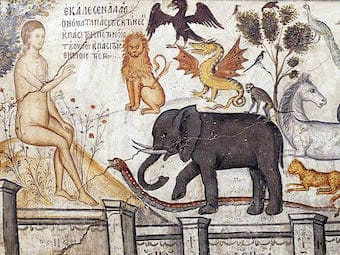Introduction
The Bible begins with a compelling account of the creation of the world in six days. The making of man is briefly mentioned in Day Six, but the authors had a great deal more to tell us. In the passages that follow here, we learn of the forming of man from the earth, of the gift of woman, and of the deceitful serpent that turned them both against their Maker.
Show Index
1
The Garden of Eden
Genesis 2:8-17
And the LORD God planted a garden eastward in Eden; and there he put the man whom he had formed.
9 And out of the ground made the LORD God to grow every tree that is pleasant to the sight, and good for food; the tree of life also in the midst of the garden, and the tree of knowledge of good and evil.
10 And a river went out of Eden to water the garden; and from thence it was parted, and became into four heads.
11 The name of the first is Pison: that is it which compasseth the whole land of Havilah, where there is gold;
12 And the gold of that land is good: there is bdellium and the onyx stone.
13 And the name of the second river is Gihon: the same is it that compasseth the whole land of Ethiopia.
14 And the name of the third river is Hiddekel: that is it which goeth toward the east of Assyria. And the fourth river is Euphrates.
15 And the LORD God took the man, and put him into the garden of Eden to dress it and to keep it.
16 And the LORD God commanded the man, saying, Of every tree of the garden thou mayest freely eat:
17 But of the tree of the knowledge of good and evil, thou shalt not eat of it: for in the day that thou eatest thereof thou shalt surely die.
Tags
Bible Readings (18)Archive
Previous: Of the Beginning of Days Next: Cain and Abel

